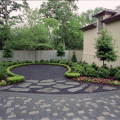Permeable Paver Driveways
The best permeable paver driveway designs for Houston landscaping projects are those that either use interlocking pavers or porous pavers.
Both types of pavers are normally rendered decorative so that they can better support the architecture of the home. Adding a decorative touch to the hardscape also masks its utilitarian function with an aesthetic that sets the tone for other surface areas like patios, walkways, stepping stones, and courtyards.
Permeable paver driveways are becoming increasingly popular now that Houston is beginning to embrace a growing environmental awareness. Both in city government, and on a grass roots level, more people are looking for ways to Go Green. Accordingly, many Houston landscaping clients are gaining an increasing interest in ecologically sound landscaping techniques that can contribute to the ongoing improvement of the Gulf Coast’s environmental quality of life.
It is important that people who are considering ecologically sound Houston landscaping elements like permeable paver driveway designs be mindful of the basic facts that characterize this type of hardscape. Different types of pavers exist, and some work better in our climate than others. Some are very affordable, but they do not look very professional. To be truly affective on all levels, the hardscapes they create must visually compliment the surrounding elements, and they must support the architecture of the home.
On a functional level, concrete that is permeable must be at least as durable as standard concrete, and it must work to better the environmental conditions of both the yard and its surrounding neighborhood.
In our experience, we have found that the two most effective types of permeable paver driveways that fulfill both requirements are those with concrete, interlocking pavers, and those that are built of decorative, porous pavers fitted closely together.
Many interlocking pavers are not permeable in and of themselves. They form either a web, or an interlocking grid, filled with a pervious substance that allows water to pass through it.
When professionally designed byHouston landscaping experts in driveway design, this network of pervious sand or crushed gravel will filter water through the surface of the hardscape. For smaller driveways, and for clients on a budget, these pavers are more than adequate for the purposes intended.
Larger driveways, however, have such large surface areas that the entire hardscape must be permeable. A 30 X 30 foot driveway can shed 550 gallons of water during a one inch rain. That is an enormous amount of storm water running into the city streets, the storm sewers, and on into our network of bayous. Of course, any pollutants that are carried by the rain go right into the bayous as well.
Permeable paver driveways can be also made of completely porous concrete that will absorb most of this rainwater before it gets into our water supply. This concrete has tiny holes that cannot be seen by the eye, but which water will flow through quickly. As storm water passes through this network of tube-like passageways, it reaches the underside of the paver and filters through a foundational layer into the ground.

